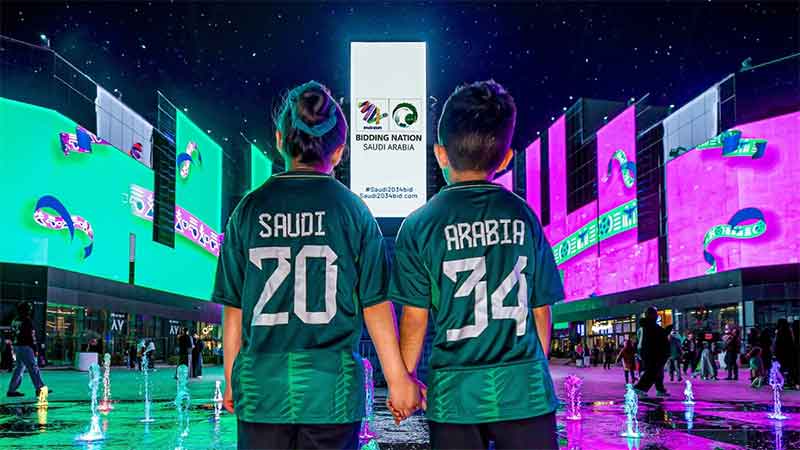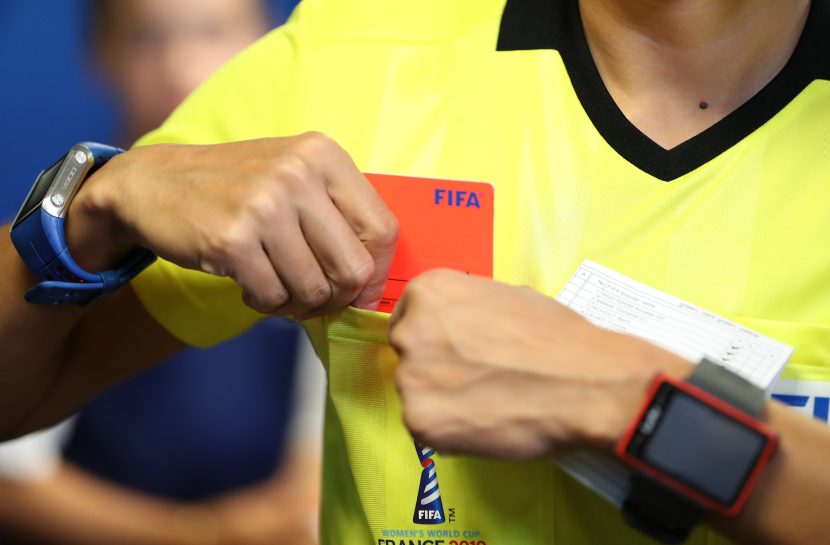FIFA has struck again. With its trademark flair for imaginative interpretation, questionable reasoning, and brazen confidence, the international football governing body has concluded that the Kingdom of Saudi Arabia is suitable for hosting the most significant sporting occasion outside the Olympics. The FIFA Men’s World Cup will once more take place in a desert nation, […]


FIFA has struck again. With its trademark flair for imaginative interpretation, questionable reasoning, and brazen confidence, the international football governing body has concluded that the Kingdom of Saudi Arabia is suitable for hosting the most significant sporting occasion outside the Olympics. The FIFA Men’s World Cup will once more take place in a desert nation, where football is a newer passion, but shrewd exploitation is not.
There are undoubtedly numerous advantages aligning with Saudi Arabia, which presented its formal proposal to host the competition in July this year. For starters, hosting such colossal events entails overwhelming costs for the nation, its cities, and the people. This substantial deterrent tends to narrow down the list of potential candidates. (Saudi Arabia was the only nation that submitted a bid for the 2034 tournament.)
The nation has also been pursuing a sports strategy that currently entails over 900 sponsorship agreements, a third of which are associated with its US$925 billion sovereign wealth fund. The Kingdom has significantly invested in football, whether through sponsorships, partnerships, or investments. These tactics are crucial components of the Kingdom’s “Vision 2030” initiative.
A report from the publicly funded Danish institute Play the Game highlights a certain level of sophistication and adaptability among the Kingdom’s sports leaders. “Unlike many of their counterparts in global sports, Saudi sports leaders hold multiple roles that merge leadership in sports with senior positions within the state machinery, giving them unmatched political and financial control.”
These individuals exhibit a chameleon-like behavior, concurrently occupying roles in sports, crucial ministries, state-owned enterprises, and the sovereign wealth fund itself. The report refers to Yasir Al-Rumayyan as an example, who serves as the governor of the Public Investment Fund and chairman of the state-owned oil and gas titan Aramco, along with being actively involved in sports. This enables a fluid transition between acting as a sports leader, financial powerhouse, or state representative, depending on the situation.
Considering the Kingdom’s extensive engagement in football, FIFA’s evaluation of the bid was never likely to be overly critical. Moreover, football’s governing authority has its own partnership with Aramco, revealed in April this year. “This partnership,” stated FIFA President Gianni Infantino, “will aid FIFA in successfully conducting its flagship tournaments over the upcoming four years and, as with all our commercial agreements, allows us to provide enhanced support to our 211 FIFA member associations worldwide.” Infantino further acknowledged Aramco’s “strong history of backing world-class events” while also expressing interest in “developing grassroots sports initiatives.”
The announcement failed to resonate positively with over a hundred international women footballers who endorsed an open letter to the FIFA president condemning the Kingdom’s extensive sportswashing efforts. “Saudi authorities have been investing billions in sports sponsorships to divert attention from the regime’s harsh human rights violations, but its treatment of women speaks volumes.” These included the jailing of Salma al-Shebab, Manal al-Gafiri, Fatima al-Shawarbi, Sukaynah al-Aithan, and Nourah al-Qahtani.
The letter also sharply criticized the Saudi authorities for infringing “not only on women’s rights but on the freedoms of all other citizens as well. Just picture LGBTQ+ players, many of whom are celebrated figures in our sport, being expected to promote Saudi Aramco during the 2027 [Women’s] World Cup, the national oil company of a regime that criminalizes their relationships and the principles they embody?”
These were merely murmurs to FIFA, whose evaluation was somewhat embarrassingly favorable, landing at 4.2 out of 5. The human rights risk assessment was classified as “medium.” The Saudi Gazette gleefully reported an assessment that marked “the highest in the tournament’s history.”
In its evaluation, FIFA claimed to have “consulted various sources, including the bidder’s human rights strategy, the mandated context assessment, as well as direct commitments from the host country and host cities, along with all contractual hosting documents, which notably include provisions related to respecting human rights in connection with the competition.”
The governing body reiterated the familiar and flawed argument that the sport had “good potential” to inspire reforms and “contribute to positive human rights results.” Riyadh had also demonstrated a “good commitment to sustainability,” although FIFA acknowledged that climate represented an “elevated risk.”
Many of the conclusions were derived from a report titled “Independent Context Assessment Prepared for the Saudi Arabian Football Federation in relation to the FIFA World Cup 2034.” (The term “independent” in most reports often suggests the opposite.) The evaluations were always likely to be favorably skewed. For one, it was created by the Saudi branch of the Clifford Chance law firm. The report also overlooked several relevant international human rights instruments on the grounds that the Kingdom had either not ratified them or that the Saudi Football Federation did not find them applicable to the evaluation. There was no mention of freedom of expression, assembly, and association, not to mention discrimination against LGBTQI+ communities, the right to freedom of religion, or specific labor rights such as union membership.
Human rights organizations have been actively working to refocus attention on the Kingdom’s checkered history. In a statement from October 28, 11 organizations, including Amnesty International, Human Rights Watch, Football Supporters Europe, labor groups, Gulf human rights organizations, and a Saudi Arabian diaspora group expressed that a poor human rights record has deteriorated “under the de facto governance of Crown Prince Mohammed bin Salman, who has overseen a rising number of mass executions, torture, enforced disappearances, severe limits on free expression, repression of women’s rights under the male guardianship framework, LGBTI+ discrimination, and the deaths of hundreds of migrants at the Saudi Arabia-Yemen border.” The Kafala (labor sponsorship) system, along with the ban on trade unions, continues to lead to the exploitation of migrant workers.
Not everything has been smooth regarding the endorsement of FIFA’s decision, particularly at the level of different football organizations whose backing is also required. However, even there, Saudi sports strategies have been evident in ensuring a lack of opposition. The Asian Football Confederation (AFC), for example, was unlikely to oppose the decision, given Riyadh’s partnership with the AFC as a global ally from 2021 to 2024, a relationship extended in July 2024 for an additional five years.
As this is being written, the Football Association has not yet determined if an official endorsement will be provided. While the BBC has been informed that FA officials are troubled by the human rights aspects, there is also a fear that accusations of hypocrisy will emerge should the organization subsequently participate in the tournament. It appears that no one wants to miss the occasion. And the Saudi authorities are acutely aware of this.
Dr. Binoy Kampmark was a Commonwealth Scholar at Selwyn College, Cambridge. He currently teaches at RMIT University. Email: [email protected]














